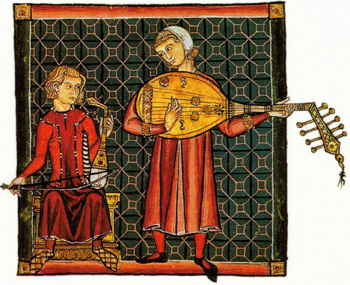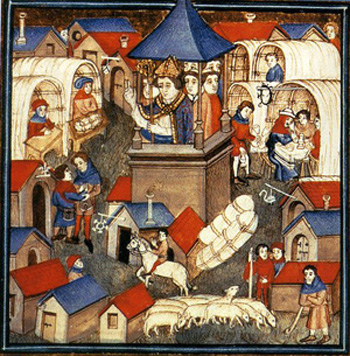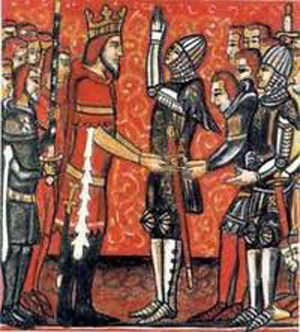Organic Society
 |
 |
 |
 |
 |
 |
 |
Contracts & Honor - I
A Society Based on a Forestland of Contracts
Because it was profoundly permeated by Catholic doctrine, the Middle Ages is an epoch that is simultaneously very easy and very difficult to study.
It is very easy because everything can be analyzed under the light of Catholic doctrine. When we find a complex institution, we know that it is Catholic, and this already gives us many solid dogmatic, moral, social and political presuppositions to understand it, which we would not have if it were not Catholic.
On the other hand, it happens that society in the Middle Ages, precisely because it was permeated by Catholic doctrine, was adaptable to circumstances. The result was a very complex network of relationships and realities, which make it a period difficult to fully understand.
 Contemporary poets, mainly those of the 19th century, who made verses about the Middle Ages, understood quite well that the base of the whole society was honor. They caught admirably how honor created a poetic atmosphere in that historic epoch. This emphasis helped to restore the prestige of the Middle Ages, which had been tarnished by the lies of the Renaissance, Protestantism and the French Revolution.
Contemporary poets, mainly those of the 19th century, who made verses about the Middle Ages, understood quite well that the base of the whole society was honor. They caught admirably how honor created a poetic atmosphere in that historic epoch. This emphasis helped to restore the prestige of the Middle Ages, which had been tarnished by the lies of the Renaissance, Protestantism and the French Revolution.
Besides those poets, there are also many scholars who turned toward the study of the rich medieval poetry. We know that in fact the minstrels and troubadours of that time played an important social role. Notwithstanding, the influence of honor in the Middle Ages was more than its poetry. Actually, it is a mistake to view it exclusively from this perspective.
True poetry reflects the beauty of the truth. Therefore, poetry must proceed from the recognition of the truth. First, then, the truth must be clear, defined, articulated and ready to be communicated to others in society. Then, poetry flows from it.
In the Middle Ages, the sense of honor dominated and infused all of social life. This sentiment permeated some of its most poetic medieval institutions, such as Chivalry. To this day, when we want to say that a man has the plenitude of manly qualities, we call him “a knight.”
The poetry of the troubadours frequently dealt with the question of honor in its descriptions of fights, tournaments and brave deeds.
Different juridical perspectives
The role of honor, however, is rarely analyzed inside the medieval juridical system so that lessons can be applied for our times. This is what I want to address in this series that begins here.
On other occasions I had the opportunity to show that in the Middle Ages the organization of the State was profoundly different from both the Modern State and the State based on Natural Law as described by Catholic scholars.
 According to these scholars, there is first the Natural Law, which is an expression of God’s will. Natural Law is the solid stone platform over which the rails of Positive Law must be built. Positive Law, that is, the laws made by the State, runs over this platform of Natural Law: this is the only habitual demand of these Catholic scholars.
According to these scholars, there is first the Natural Law, which is an expression of God’s will. Natural Law is the solid stone platform over which the rails of Positive Law must be built. Positive Law, that is, the laws made by the State, runs over this platform of Natural Law: this is the only habitual demand of these Catholic scholars.
Thus, there are two legislative zones. The first is the unwritten Natural Law. Over this zone is a second layer composed by Positive Law. That is all they ask.
Within these zones defined by Natural Law and Positive Law, men have a margin of liberty, which is greater or lesser according to the gamut of movements allowed by their positive laws. Within these limits, they have the freedom to do whatever they want.
Here we find the model of the free citizen, at the age of majority in full enjoyment of all his civil rights. He does whatever he wants without the need to give satisfaction to anyone. For this reason, private life becomes inconsistent. No stable situations or institutions are born from this conception of freedom. Everything is mutable, floating; everything relies on the vacillating play of circumstances.
This is the opposite of the medieval organization. Then, also, there was Natural Law, but alongside it was Ecclesiastical Law, which played an enormous role that is rarely mentioned by scholars of Natural Law. In addition there were the laws of the State and the contracts made among persons and groups.
All of medieval society was constituted by contracts made among persons, groups, and groups of groups until reaching the larger institution, the State, represented by the King. Those contracts gave origin to defined, stable institutions; they governed long after the lives of the persons who established them; they created specific rights and duties for many generations to come.
 Old Portuguese Law used to establish treaties that were perpetual. To signify this, the contractual documents would end by stating that they were valid “until the end of the world.”
Old Portuguese Law used to establish treaties that were perpetual. To signify this, the contractual documents would end by stating that they were valid “until the end of the world.”
In Brazil, we also have many cases where the same rule was present. For example, in the donation of territory made by the Prefecture of São Paulo to the Benedictine Order to build the Monastery of St. Benedict downtown, the final clause reads: “The present donation, in all its clauses, is in effect until the end of the world.” It reflects well the desire for stability and perpetuity.
The medieval concessions of land made by suzerains to their vassals, by vassals to their vassals, and by a noble superior to a plebeian inferior were all made to endure “until the end of the world.” The guilds were also constituted by contracts established among the various parts that expressed a similar desire for stability.
Therefore, when persons were born, they were already bound by contractual agreements that were established by their families before their birth and would last long after their deaths. Often, the interested parties did not have the right to change those contracts.
This contractual aspect of society was parallel to Ecclesiastical Law and Positive Law and constituted a type of forestland that, in many ways, was the most important part of life. Those contracts were private laws for each of the parts, and over this reality medieval life based itself.
Continued

It is very easy because everything can be analyzed under the light of Catholic doctrine. When we find a complex institution, we know that it is Catholic, and this already gives us many solid dogmatic, moral, social and political presuppositions to understand it, which we would not have if it were not Catholic.
On the other hand, it happens that society in the Middle Ages, precisely because it was permeated by Catholic doctrine, was adaptable to circumstances. The result was a very complex network of relationships and realities, which make it a period difficult to fully understand.

The poems of the troubadours celebrated honor
Besides those poets, there are also many scholars who turned toward the study of the rich medieval poetry. We know that in fact the minstrels and troubadours of that time played an important social role. Notwithstanding, the influence of honor in the Middle Ages was more than its poetry. Actually, it is a mistake to view it exclusively from this perspective.
True poetry reflects the beauty of the truth. Therefore, poetry must proceed from the recognition of the truth. First, then, the truth must be clear, defined, articulated and ready to be communicated to others in society. Then, poetry flows from it.
In the Middle Ages, the sense of honor dominated and infused all of social life. This sentiment permeated some of its most poetic medieval institutions, such as Chivalry. To this day, when we want to say that a man has the plenitude of manly qualities, we call him “a knight.”
The poetry of the troubadours frequently dealt with the question of honor in its descriptions of fights, tournaments and brave deeds.
Different juridical perspectives
The role of honor, however, is rarely analyzed inside the medieval juridical system so that lessons can be applied for our times. This is what I want to address in this series that begins here.
On other occasions I had the opportunity to show that in the Middle Ages the organization of the State was profoundly different from both the Modern State and the State based on Natural Law as described by Catholic scholars.

The medieval social order was stably held together by rights and duties originating from contracts
Thus, there are two legislative zones. The first is the unwritten Natural Law. Over this zone is a second layer composed by Positive Law. That is all they ask.
Within these zones defined by Natural Law and Positive Law, men have a margin of liberty, which is greater or lesser according to the gamut of movements allowed by their positive laws. Within these limits, they have the freedom to do whatever they want.
Here we find the model of the free citizen, at the age of majority in full enjoyment of all his civil rights. He does whatever he wants without the need to give satisfaction to anyone. For this reason, private life becomes inconsistent. No stable situations or institutions are born from this conception of freedom. Everything is mutable, floating; everything relies on the vacillating play of circumstances.
This is the opposite of the medieval organization. Then, also, there was Natural Law, but alongside it was Ecclesiastical Law, which played an enormous role that is rarely mentioned by scholars of Natural Law. In addition there were the laws of the State and the contracts made among persons and groups.
All of medieval society was constituted by contracts made among persons, groups, and groups of groups until reaching the larger institution, the State, represented by the King. Those contracts gave origin to defined, stable institutions; they governed long after the lives of the persons who established them; they created specific rights and duties for many generations to come.

Personal contracts between lords and vassals were an important part of medieval society
In Brazil, we also have many cases where the same rule was present. For example, in the donation of territory made by the Prefecture of São Paulo to the Benedictine Order to build the Monastery of St. Benedict downtown, the final clause reads: “The present donation, in all its clauses, is in effect until the end of the world.” It reflects well the desire for stability and perpetuity.
The medieval concessions of land made by suzerains to their vassals, by vassals to their vassals, and by a noble superior to a plebeian inferior were all made to endure “until the end of the world.” The guilds were also constituted by contracts established among the various parts that expressed a similar desire for stability.
Therefore, when persons were born, they were already bound by contractual agreements that were established by their families before their birth and would last long after their deaths. Often, the interested parties did not have the right to change those contracts.
This contractual aspect of society was parallel to Ecclesiastical Law and Positive Law and constituted a type of forestland that, in many ways, was the most important part of life. Those contracts were private laws for each of the parts, and over this reality medieval life based itself.
Continued

Posted December 11, 2013
Organic Society was a theme dear to the late Prof. Plinio Corrêa de Oliveira. He addressed this topic on countless occasions during his life - at times in lectures for the formation of his disciples, at times in meetings with friends who gathered to study the social aspects and history of Christendom, at times just in passing.
Prof. Plinio
Atila S. Guimarães selected excerpts of these lectures and conversations from the transcripts of tapes and his own personal notes. He translated and adapted them into articles for the TIA website. In these texts fidelity to the original ideas and words is kept as much as possible.
______________________
______________________












